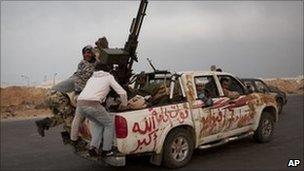Libya: Gaddafi's fighters force rebel retreat
- Published

Rebels in Libya are retreating from their former strongholds along the eastern coast as they come under fire from Col Muammar Gaddafi's forces.
The rebels have now lost the key oil port of Ras Lanuf and the nearby town of Bin Jawad, and are also in full retreat from Brega.
In the west, the rebel-held town of Misrata is still coming under attack from pro-Gaddafi troops, reports say.
Meanwhile, Libya's foreign minister is in London amid reports he has defected.
UK government sources told the BBC they were confident that Moussa Koussa, who flew to London on Wednesday, had come to London to escape the Gaddafi regime.
A Foreign Office spokesperson said: "We can confirm that Moussa Koussa arrived at Farnborough Airport on 30 March from Tunisia. He travelled here under his own free will. He has told us that he is resigning his post. We are discussing this with him and we will release further detail in due course.
"Moussa Koussa is one of the most senior figures in Gaddafi's government and his role was to represent the regime internationally - something that he is no longer willing to do.
"We encourage those around Gaddafi to abandon him and embrace a better future for Libya that allows political transition and real reform that meets the aspirations of the Libyan people."
Civilians 'flee Ajdabiya'
Britain's prime minister has said arming the rebels has not been ruled out. David Cameron's remarks echoed those made earlier by US President Barack Obama.
The BBC's Ben Brown in Ajdabiya says the rebels simply cannot compete with the discipline and firepower of Col Gaddafi's forces.
He says the current situation is a dramatic about-turn for the rebels who, over the weekend, had seized a string of towns along the coast and seemed to be making good progress.
One rebel on the edge of Brega was angered that the coalition appeared to have slowed down its campaign.
"We want two things: that the planes drop bombs on Gaddafi's tanks and heavy artillery, and that they give us weapons so we can fight," 27-year-old fighter Younus Abdelghaim told AFP news agency.
Most reports suggested the rebels had fled back to Ajdabiya, and some witnesses said civilians had begun to flee further east towards the rebel-held city of Benghazi.
But a rebel commander in Benghazi insisted that fighting was still going on in Brega, and called for coalition help.
Later, an AFP reporter in Ajdabiya said he had seen coalition air strikes west of Ajdabiya.
If confirmed, the air raid would be the first in the area in two days.
France and the US say they are sending envoys to Benghazi to meet the interim administration.
British Foreign Secretary William Hague said a UK diplomat had already met Libyan rebel leaders in Benghazi earlier this week.
The UK has also made moves to expel five Libyan diplomats based in London, Mr Hague told MPs on Wednesday.
Mr Obama told reporters on Tuesday that Col Gaddafi had been greatly weakened by the coalition air strikes and would ultimately step down.
Mr Cameron said that the RAF had flown 24 sorties over Libya on Tuesday night which had destroyed artillery and an armoured vehicle near the strategic city of Sirte.
Sirte is Col Gaddafi's birthplace and lies on Libya's northern coast, roughly half way between the capital Tripoli and Benghazi.
On Tuesday, the Obama administration and British foreign secretary suggested the UN resolution authorising international action in Libya could also permit the supply of weapons.
The BBC's Ben Brown on the consequences of arming rebels
This message was reinforced by Mr Cameron in parliament on Wednesday.
"UN [Security Council Resolution] 1973 allows all necessary measures to protect civilians and civilian-populated areas, and our view is this would not necessarily rule out the provision of assistance to those protecting civilians in certain circumstances," he said.
"We do not rule it out, but we have not taken the decision to do so."
But Russian Foreign Minister Sergei Lavrov disputed that UN resolution 1973 gave a mandate to arm the rebels.
"The Nato Secretary General Fogh Rasmussen declared that the operation in Libya was being staged to protect the population and not to arm it - and here, we completely agree with the Nato secretary general," he said.
In a separate development, an international conference on Libya in London has agreed to set up a contact group involving Arab governments to co-ordinate help for a post-Gaddafi Libya.
Meanwhile, Human Rights Watch has accused Col Gaddafi's forces of laying both anti-personnel and anti-vehicle mines during the current conflict after a discovery of what it said were dozens of mines on the eastern outskirts of Ajdabiya.
"Libya should immediately stop using anti-personnel mines, which most of the world banned years ago," said Peter Bouckaert of Human Rights Watch. "Gaddafi's forces should ensure that mines of every type that already have been laid are cleared as soon as possible to avoid civilian casualties."
Several thousand people have been killed and thousands wounded since the uprising against Col Gaddafi's rule began more than six weeks ago.